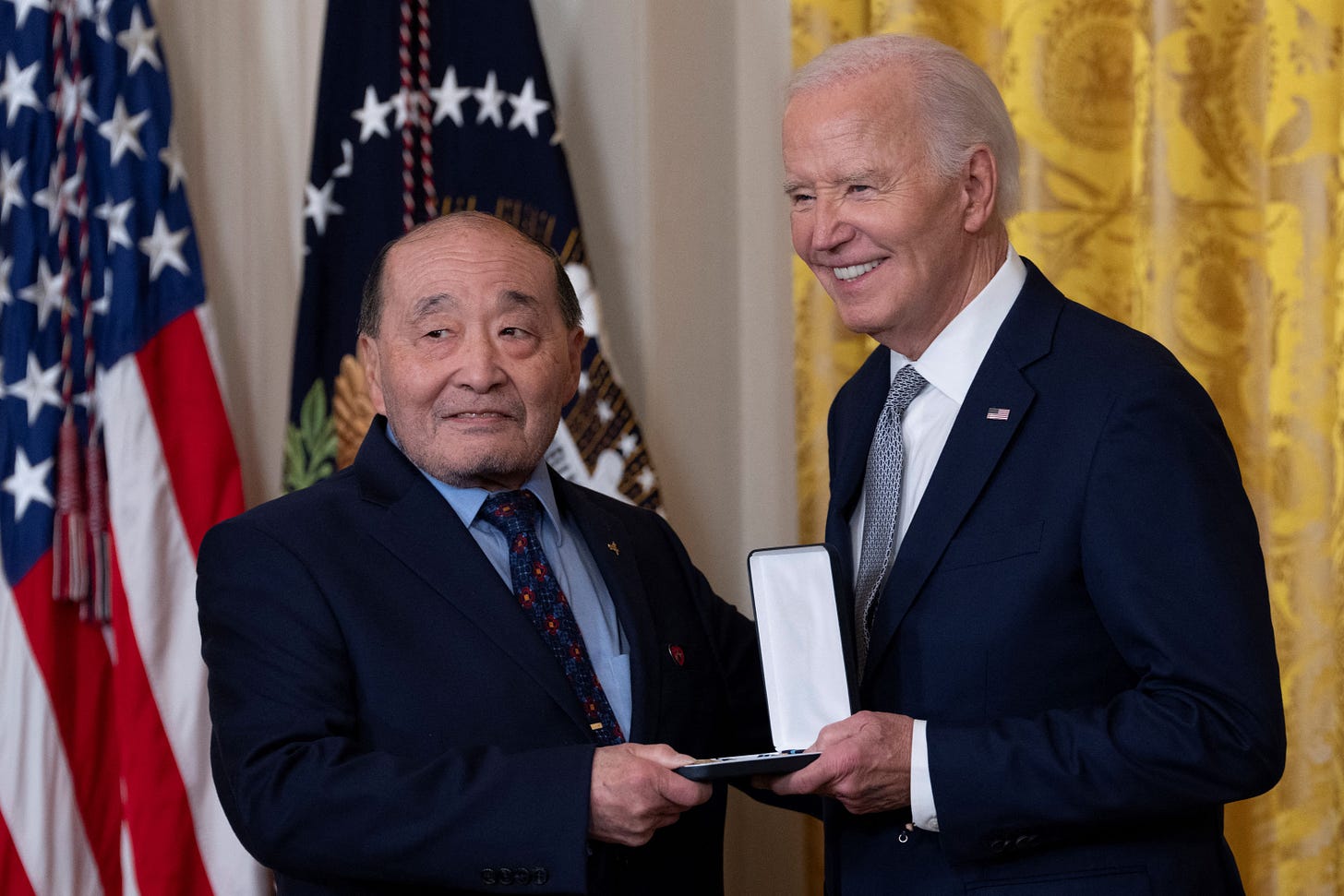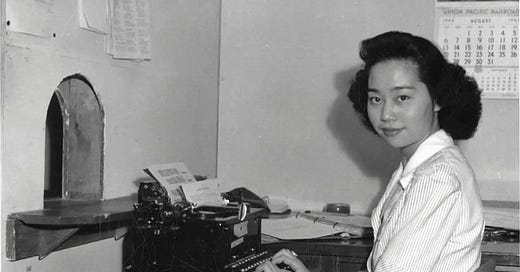A History Lesson You Never Learned
And the White House honor sending a message … to Donald Trump
Today’s Steady will be a bit of a history lesson. “Those who cannot remember the past are condemned to repeat it” is an oft-cited quote, for good reason. Let’s hope those about to be in power are paying attention.
The story begins with Mitsuye Endo, who was born in Sacramento, California, in 1920 to Japanese parents. After graduating from high school, she attended secretarial school and soon after landed a job as a typist at the California Department of Motor Vehicles. In the spring of 1942, just months after the Japanese attack on Pearl Harbor, Endo was suddenly let go from her job and forced to relocate with her parents to an internment camp 300 miles north.
“We were given a piece of paper saying we were suspended because we were of Japanese ancestry,” Endo said in an interview for the book And Justice for All: An Oral History of the Japanese American Detention Camps.
President Franklin Roosevelt, citing the Alien and Sedition Acts of 1798, issued Executive Order 9066 just after the U.S. entered World War II. The controversial order gave the secretary of war the power to intern people who were deemed disloyal or a threat to national security. Very quickly, more than 120,000 Japanese Americans were incarcerated, two-thirds of whom were American citizens.
The questionably legal internment of American citizens of Japanese ancestry did not go unnoticed. Several cases made their way through the courts at the time but ultimately failed. In 1944, a lawyer hired by the Japanese American Citizens League found Endo.
She was the perfect plaintiff. An American citizen, Endo had never been to Japan — she didn’t even speak the language. She was a Protestant who had gone to public school and worked for the government. Her brother was serving in the U.S. Army. She was also held against her will by her government for more than two and a half years.
And it was not just her fight. “They felt I represented a symbolic, ‘loyal’ American,” Endo said, thus battling discrimination and paranoia for thousands of people.
The case quickly moved to the Supreme Court. In October 1944, during oral arguments, Endo’s lawyers said that her detention was unconstitutional, that it violated her Fifth Amendment rights: No one shall be “deprived of life, liberty or property without due process of law.”
The court agreed and ruled unanimously in Endo’s favor. The majority opinion stated that the U.S. government could not detain a citizen who was “concededly loyal” to the United States, regardless of the principle of “military necessity.”
Because of the ruling, most of the internment camps were soon closed. But the incarceration of citizens using an antiquated statute became a wound on our national psyche that has never fully healed. It wasn’t until more than four decades later that Congress passed and President Ronald Reagan signed the Civil Liberties Act of 1988, which acknowledged the injustice of the camps and apologized for the internment. It also provided $20,000 in reparations for each interned person.
Do we learn from our lessons? Perhaps not. Witness what is about to happen with Donald Trump and his plans for mass deportation.
Trump has made no secret that he wants to deport the 11 million undocumented immigrants reportedly in the United States. But you can’t simply deport 11 million people. Everyone, even those in this country without the proper documentation, is guaranteed due process.
Trump, not known for his patience, has said he plans to use the Alien and Sedition Acts of 1798 to move the process along. Ring a bell? That is the same law Roosevelt cited to justify Executive Order 9066. Maybe someone should tell him how that worked out.
There is a good chance Trump and his isolationist inner circle will weaponize the flawed law and apply it to people from places they deem to be “invading” the U.S. Trump has characterized several countries as a “threat” — countries where many immigrants come from. He has also promised not to separate families. So American-born children of undocumented immigrants would be detained with their parents, which means American citizens could once again be incarcerated by their government.
Trump has said would “be open” to using detention camps to house the immigrants awaiting deportation. “Whatever it takes to get them out. I don’t care. Honestly, whatever it takes to get them out,” he told Time magazine.
Bypassing equal protections and circumventing due process is a real and present danger for migrants and their families.
Playing on people’s fears is one of Trump’s favorite ploys. In a PRRI poll conducted just after the election, 46% of Republican voters said the military should put undocumented immigrants into camps until they can be deported. This may be a chicken-and-egg scenario. Is the Republican base afraid of immigrants, or has Trump made them so because of his hyperbolic invective? Either way, the fear is allowing Trump to make some stunning proposals in the name of national security.
Mitsuye Endo’s story is a cautionary one. It shows us how important constitutional protections are, especially during times of crisis, and how easily civil liberties can be sidelined when a fear-driven narrative takes hold.
On Thursday, President Joe Biden honored 20 Americans at the White House with the Presidential Citizens Medal. One of those selected was Mitsuye Endo, who died in 2006. Her son accepted the honor in her name. Endo’s courage and determination changed the course of history and helped further enshrine constitutionally protected civil liberties. Those liberties are currently under attack.

“Her resolve allowed thousands of Japanese Americans to return home and rebuild their lives, reminding us that we are a Nation that stands for freedom for all,” the White House said in a statement.
It is hard to believe the White House coincidently chose to honor Endo at this moment in history with Trump and his agenda arriving in a little over two weeks. Perhaps they felt it was a good time to remind folks of what her case meant and what it could mean.
To support my team’s efforts to protect our democracy through the power of independent journalism, please consider joining as a paid subscriber. It keeps Steady sustainable and accessible for all. Thank you.
No matter how you subscribe, I thank you for reading.
Stay Steady,
Dan




George Takei has worked hard to pass on the lessons of the internment. He too was one of those who were sent to the camps.
I have just upgraded to PAID, and I want to tell you why.
Dan Rather goes back further than many of you who are reading this now, and he has seen more history occur than most of us. He is the inheritor of the CBS News legacy which was headed by the likes of Walter Cronkite, Eric Severeid, Robert Trout, Morley Safer, Mike Wallace, and, ultimately, Edward R. Murrow. Dan's commitment to the truth and the wisdom of years is unmatched right now, and I am glad he still sees fit to put out informed commentary that counters all the BS we are being flooded with right now.
It is informed info like this article that keeps the ship (to coin a phrase) "steady".
Rock on, Dan!!!